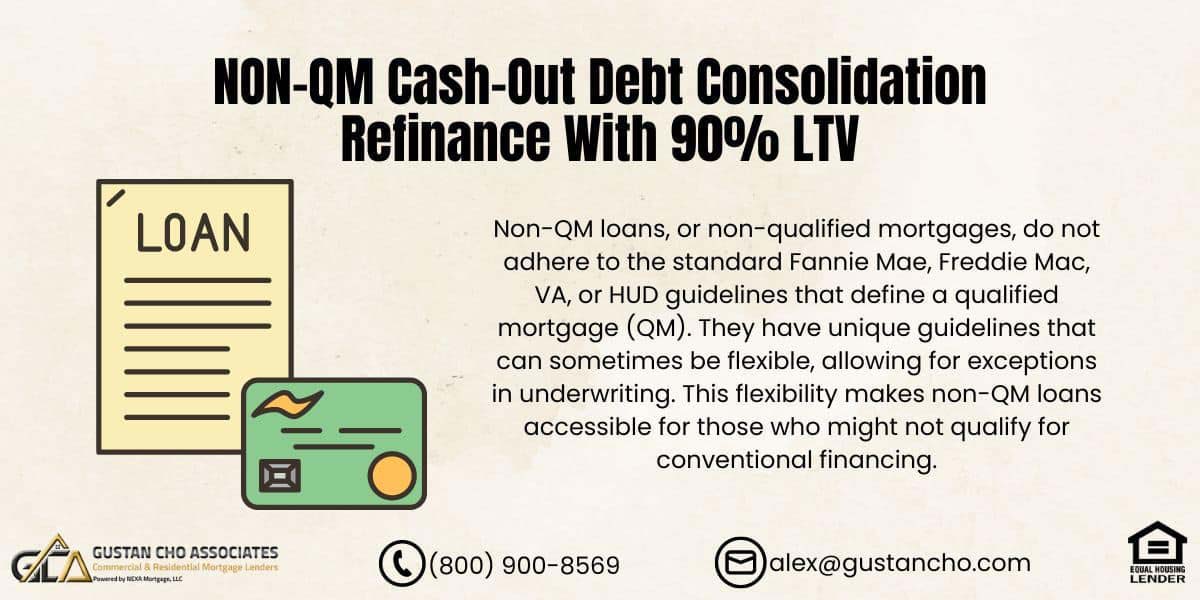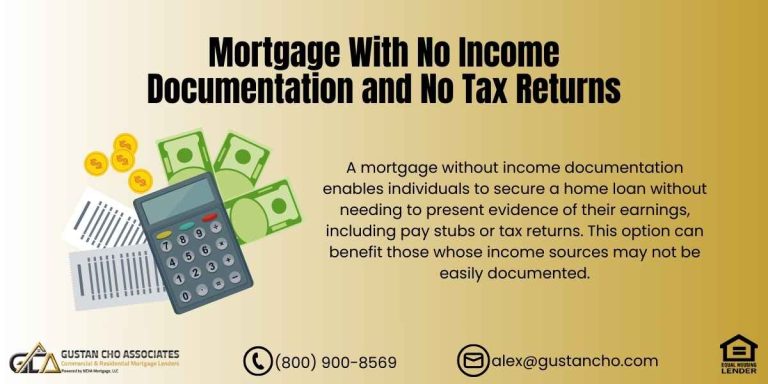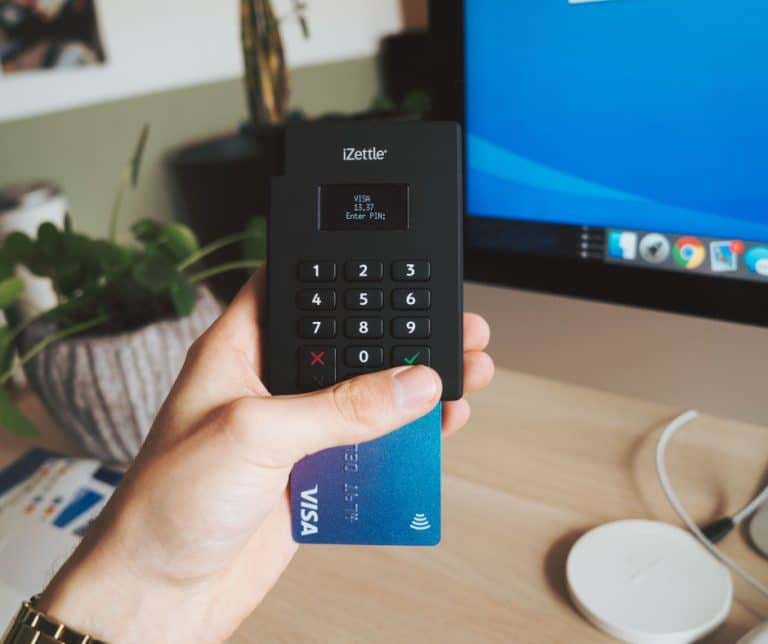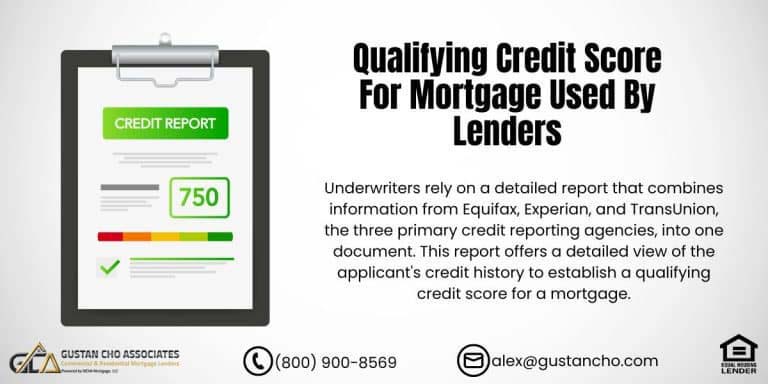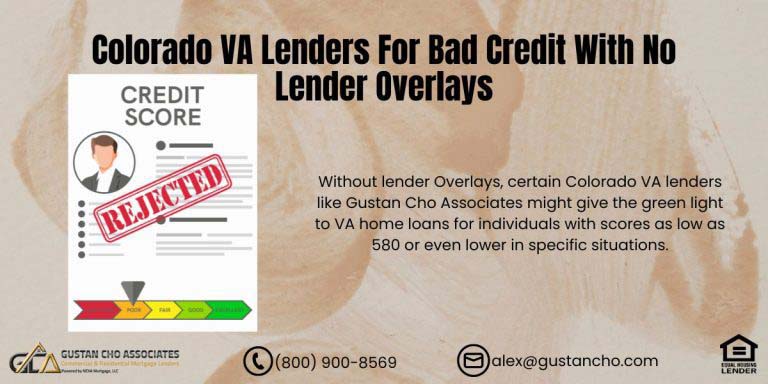This Article Is About NON-QM Cash-Out Debt Consolidation Refinance With 90% LTV.
The housing market is hot despite rising mortgage rates. Nationwide, home prices have been steadily increasing year after year since 2010. Most of Florida, Texas, Georgia, California, Colorado, New Jersey, Indiana, Pennsylvania, Kentucky, Mississippi, Michigan, Illinois have seen home values increase double digits.
Many homeowners are thinking of consolidating all of their debts by doing a cash-out refinancing. Consumers are paying credit card interest rates north of 20%. Many consumers have car payments that are higher than $500 per month. Gustan Cho Associates Mortgage Group now offers NON-QM Cash-Out Debt Consolidation Refinance up to 90% LTV.
What Are NON-QM Versus QM Mortgages
What is a NON-QM mortgage? QM stands for a qualified mortgage. Just like it is spelled, it means a non-qualified mortgage. For more information on what a qualified mortgage is please see our blog explaining a QM MORTGAGE. In short, a NON-QM mortgage does not follow Fannie Mae, Freddie Mac, VA, or HUD guidelines for mortgage qualifications.
They have their individual set of guidelines. These guidelines are black and white. We can get exceptions and have a gray area when it comes to underwriting. This opens up mortgage opportunities to many Americans who cannot qualify for your everyday conventional financing.
Consolidate Your Debt with a Non-QM Cash-Out Refinance at 90% LTV!
Contact us today to explore your options for cash-out debt consolidation with a 90% LTV.
NON-QM Lending Guidelines
NON-QM Loans are becoming increasingly more and more popular. Home Buyers do not have a mandatory waiting period after bankruptcy and/or housing event like government and/or conventional loans. There is no maximum loan limit. There is no private mortgage insurance required. Gustan Cho Associates has 95% LTV NON-QM Jumbo Mortgages with no mortgage insurance.
We offer bank statement loans for self-employed borrowers with no private mortgage insurance and no tax returns required. Loan Limits can be up to $3 million and may be higher depending on circumstances. NON-QM Mortgages are NOT for borrowers with bad credit. Many borrowers with great credit can benefit from our non-QM loan programs.
Difference Between NON-QM Cash-Out Debt Consolidation Refinance Versus Traditional Cash-Out Refinance
Many homeowners who bought their properties a few years back have witnessed significant appreciation in home values. Unlike traditional cash-out refinancing, a NON-QM Cash-Out Debt Consolidation Refinance allows for a higher loan value, providing more financial leverage for homeowners. This can be particularly appealing for those looking to consolidate debt while tapping into the increased equity of their homes.
Debt consolidation is a crucial topic, though only sometimes pleasant to discuss. Many Americans find their debt levels increasing during the holiday season as they spend on travel and gifts. Additionally, unexpected events like car accidents or medical emergencies can exacerbate financial strain. Regardless of the cause—unforeseen expenses or poor budgeting—many are eager to escape the debt burden.
Despite the challenges of securing financing due to credit issues or late payments, there is a silver lining. Obtaining a second mortgage has been difficult in recent years, and this trend may persist. However, even those with less-than-perfect credit have options available. Gustan Cho Associates offers a comprehensive array of NON-QM mortgage products, providing solutions for those who may not qualify under traditional lending criteria.
Can You Refinance a Debt Consolidation Loan?
Yes, you can refinance a debt consolidation loan, which can be beneficial if interest rates have decreased or your credit situation has improved since you originally took out the loan.
Refinancing might offer a lower interest rate, potentially reducing your monthly payments and the total interest paid over the life of the loan. Additionally, it can provide an opportunity to extend the repayment terms, which can further decrease your monthly payments. However, this may increase the total interest paid if the loan is extended significantly.
Refinancing can also consolidate additional debt accumulated since the initial loan, simplifying your finances and lowering your overall interest rates. Considering the expenses related to refinancing, such as origination and application fees, and prepayment penalties on your existing loan is crucial. Carefully comparing these costs with the potential savings from refinancing will help ensure that this financial move benefits your situation.
What is the Maximum DTI for a Non-QM Loan?
The maximum debt-to-income (DTI) ratio for a non-QM (non-qualified Mortgage) loan can vary widely depending on the lender and the specific non-QM loan product. Unlike Qualified Mortgages, which typically cap the DTI ratio at around 43%, non-QM loans offer more flexibility and can sometimes accommodate higher DTI ratios.
Non-QM lenders often assess borrowers on a case-by-case basis. They may use alternative methods to evaluate a borrower’s loan repayment ability. As a result, it’s not uncommon for non-QM lenders to accept DTI ratios higher than 43%. In some cases, lenders might even go up to 50% or higher, depending on compensating factors such as a larger down payment, substantial savings, or a particularly strong credit history.
Can you Refinance a Non-QM Loan?
Yes, you can refinance a non-QM (non-qualified Mortgage) loan, though it requires finding the right lender since not all are willing to handle such loans. Non-QM loans are generally more flexible regarding borrower qualifications but come with challenges and risks for lenders. Specialized lenders usually offer these loans with different terms and rates that reflect increased risks compared to standard Qualified Mortgages.
When refinancing a non-QM loan, you should review potential changes in interest rates, monthly payments, and overall loan terms. Factors like improved financial status since acquiring the original loan could help secure more favorable conditions. It’s also essential to assess the purpose of refinancing—whether it’s to lower payments, consolidate debt, or alter the loan’s duration—to ensure it aligns with your financial goals.
LTV On NON-QM Cash-Out Debt Consolidation Refinance Versus Traditional Cash-Out Refinance
With NON-QM mortgage loans, there is a major advantage. That advantage is the maximum loan-to-value thresholds. With cash-out NON-QM Loans, borrowers are capped at 80% loan to value. But if you were to do a debt consolidation refinance, borrowers are capped at 85% loan-to-value. That extra 5% can mean getting out of debt faster!
For credit scores 680 and above borrowers can go up to 90% loan to value for a debt consolidation NON-QM mortgage. That’s right, 90% loan-to-value, that is unheard of in the mortgage industry. When completing a debt consolidation NON-QM mortgage, you will pay your creditors directly with the loan and can receive a maximum of $2,000 cash in hand after closing. This is a great opportunity to get back on your feet. Below is a grid of credit scores and maximum loan-to-value is allowed for NON-QM lending.
Looking to Refinance and Consolidate Debt? We Offer Non-QM Cash-Out Loans with 90% LTV!
Contact us today to discuss how this option can work for you.
Credit Scores Versus Maximum LTV Cash-Out Limit
Credit Scores Impact on LTV Limits for Non-QM Cash-Out and Debt Consolidation Refinance
The maximum loan-to-value (LTV) ratio for a non-QM cash-out or debt consolidation refinance is influenced by the borrower’s credit score. Here’s how different credit scores affect the LTV limits for these refinancing options:
Credit Scores 500-579:
- Non-QM Cash-Out Refinance: Up to 70% LTV
- Debt Consolidation Refinance: Up to 75% LTV
Credit Scores 580-599:
- Both Non-QM Cash-Out Refinance and Debt Consolidation Refinance: Up to 80% LTV
Credit Scores 600-679:
- Non-QM Cash-Out Refinance: Up to 80% LTV
- Debt Consolidation Refinance: Up to 85% LTV
Credit Scores 680 and Higher:
- Non-QM Cash-Out Refinance: Up to 85% LTV
- Debt Consolidation Refinance: Up to 90% LTV
These thresholds illustrate how a higher credit score can significantly enhance a borrower’s ability to access greater loan amounts relative to the value of their property during refinancing.
Take Daniel’s situation, for instance: he owns a home in Riverside, California, valued at $450,000. Still, he has a credit score of 611 because of some late payments on his mortgage and vehicle loans.
He’s single and grappling with several debts, including a primary mortgage of $274,000, a second mortgage (HELOC) of $54,400, an auto loan for $17,500, two credit cards with balances of $11,700 and $10,300, and a personal loan of $7,500, bringing his total debt to $375,400.
By choosing a NON-QM cash-out debt consolidation refinance, Daniel can consolidate all his debts into one monthly payment that he can easily manage. As a result of this refinancing strategy, he now saves more than $700 each month. Just imagine the relief and potential uses for an extra $700 monthly, particularly when financial struggles loom large.
Such loans offer a significant lifeline that wouldn’t be possible with conventional or FHA loans due to his credit issues. This refinancing option allowed Daniel to reset his financial circumstances and gain a fresh start.
Non-Borrowing Spouses Debt Does Not Count In Community Property States
One important benefit of non-QM loans is that they function similarly to “conventional” loans, as they are not bound by the regulations of community property states. This aspect of non-QM loans allows for greater flexibility, especially in non-QM cash-out Debt Consolidation Refinance scenarios.
Furthermore, NON-QM loans are not bound by the loan limits that govern conforming or FHA loans, offering borrowers more leeway in the amount they can borrow. Non-qualified mortgage loans usually have maximum loan limits that vary from $1,000,000 to $3,000,000 based on the borrower’s credit score. This makes them attractive for those seeking substantial financing outside traditional lending parameters.
If you have done a cash-out loan in the past, you will understand 90% loan-to-value is out of this world! It really opens up the opportunity to get you out of the hole that you’re in. If you feel like a NON-QM mortgage loan might fit the needs of yourself or your family, please reach out to us directly. There are very few situations we have not come across in the past, we are always here to help.
If for any reason you do not qualify today, or you are not happy with the terms you qualify for, we will put you on a financial plan to qualify for the right mortgage as soon as possible. Consolidating your Consumer Debt into tax-deductible mortgage interest has many benefits. We are available seven days a week to go over your scenario!
We are experts on the ins and outs of NON-QM Mortgage lending. Contact Alex Carlucci at (800) 900-8569 or shoot an email to alex@gustancho.com.
FAQ About NON-QM Cash-Out Debt Consolidation Refinance With 90% LTV
- What are non-QM loans, and how do they differ from QM mortgages? Non-QM loans, or non-qualified mortgages, do not adhere to the standard Fannie Mae, Freddie Mac, VA, or HUD guidelines that define a qualified mortgage (QM). They have unique guidelines that can sometimes be flexible, allowing for exceptions in underwriting. This flexibility makes non-QM loans accessible for those who might not qualify for conventional financing.
- What are the lending guidelines for non-QM loans? Non-QM loans are becoming increasingly popular as they do not require a mandatory waiting period post-bankruptcy or other housing events like traditional loans. They have no maximum loan limit and do not require private mortgage insurance. Gustan Cho Associates offers up to 95% LTV for non-QM jumbo Mortgages without mortgage insurance and bank statement loans for self-employed borrowers.
- How does a non-QM cash-out Debt Consolidation Refinance differ from a traditional cash-out refinance? A non-QM cash-out Debt Consolidation Refinance allows homeowners to leverage higher loan values up to 90% LTV, providing greater financial flexibility. This is particularly useful for consolidating high-interest debts and tapping into the home’s increased equity, unlike traditional refinancing, which typically offers lower LTV ratios.
- Can you refinance a debt consolidation loan? Yes, refinancing a debt consolidation loan is possible. It can be beneficial if the interest rates have dropped or your credit situation has improved. Refinancing can lower interest rates, reduce monthly payments, and extend repayment terms. However, it may increase the total interest paid over time.
- What is the maximum DTI for a non-QM loan? A non-QM loan’s maximum debt-to-income (DTI) ratio varies by lender. It can often exceed the typical cap of 43% in QM loans. Some lenders may accept DTI ratios as high as 50% or more, depending on compensating factors like a larger down payment or a strong credit history.
- Can you refinance a non-QM loan? Yes, it is feasible. However, finding a lender who will refinance these types of loans is crucial, as they require specific handling due to their flexible borrower qualifications and the associated risks.
- What are the LTV ratios for NON-QM Cash-Out Debt Consolidation Refinance? For NON-QM Cash-Out Debt Consolidation Refinances, borrowers with credit scores of 680 and above can achieve up to 90% LTV. This high LTV is unique in the mortgage industry, offering significant leverage for debt consolidation.
- How do credit scores affect the LTV limits for non-QM cash-out and Debt Consolidation Refinance? Determining LTV limits is significantly influenced by credit scores. For example, a score between 500 and 579 may allow up to 70% LTV for cash-out refinances and 75% for debt consolidation. Higher scores (680+) may qualify for up to 85-90% LTV, providing greater borrowing power.
- How can NON-QM loans benefit in debt consolidation scenarios? NON-QM loans can significantly benefit homeowners like Daniel from Riverside, California, who consolidated his various debts into one manageable payment through a NON-QM cash-out debt consolidation refinance, saving over $700 monthly.
- How do NON-QM loans handle debts of non-borrowing spouses in community property states? In community property states, the debts of non-borrowing spouses are not considered in the debt calculations for NON-QM loans, providing flexibility and ease in the application process for debt consolidation refinancing.
This blog about NON-QM Cash-Out Debt Consolidation Refinance With 90% LTV was updated on April 24th, 2024.
90% LTV Non-QM Cash-Out Refinance: Perfect for Debt Consolidation!
Contact us today to learn how you can benefit from a 90% LTV Non-QM loan.


